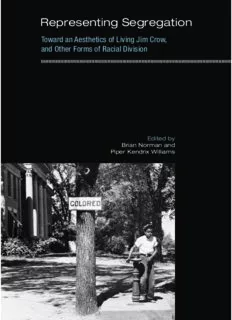
Representing Segregation: Toward an Aesthetics of Living Jim Crow, and Other Forms of Racial Division PDF
Preview Representing Segregation: Toward an Aesthetics of Living Jim Crow, and Other Forms of Racial Division
Representing Segregation Toward an Aesthetics of Living Jim Crow, and Other Forms of Racial Division Edited by Brian Norman and Piper Kendrix Williams Representing Segregation Representing Segregation Toward an Aesthetics of Living Jim Crow, and Other Forms of Racial Division Edited by BRIAN NORMAN and PIPER KENDRIX WILLIAMS iv Contents Cover photo courtesy of the Library of Congress Published by State University of New York Press, Albany © 2010 State University of New York All rights reserved Printed in the United States of America No part of this book may be used or reproduced in any manner whatsoever without written permission. No part of this book may be stored in a retrieval system or transmitted in any form or by any means including electronic, electrostatic, magnetic tape, mechanical, photocopying, recording, or otherwise without the prior permission in writing of the publisher. For information, contact State University of New York Press, Albany, NY www.sunypress.edu Production by Diane Ganeles Marketing by Michael Campochiaro Library of Congress Cataloging-in-Publication Data Representing segregation : toward an aesthetics of living Jim Crow, and other forms of racial division / edited by Brian Norman and Piper Kendrix Williams. p. cm. Includes bibliographical references and index. ISBN 978-1-4384-3033-1 (hardcover : alk. paper) ISBN 978-1-4384-3032-4 (pbk. : alk. paper) 1. American literature—African American authors—History and criticism. 2. American literature—20th century—History and criticism. 3. Segregation in literature. 4. Race in literature. 5. African Americans in literature. 6. African Americans—Segregation—Historiography. I. Norman, Brian, 1977– II. Williams, Piper Kendrix, 1972– PS153.N5R47 2010 810.9'896073—dc22 2009022997 10 9 8 7 6 5 4 3 2 1 Contents v Contents List of Illustrations ix Foreword xi Joycelyn Moody Acknowledgments xiii Introduction 1 To Lie, Steal, and Dissemble: The Cultural Work of the Literature of Segregation 1 Brian Norman and Piper Kendrix Williams In The Crowd, Artist’s Statement 11 Shawn Michelle Smith Section I: The Aesthetic Challenges of Jim Crow Politics 13 American Graffi ti: The Social Life of Segregation Signs 15 Elizabeth Abel Smacked Upside the Head—Again 37 Trudier Harris Section II: Imagining and Subverting Jim Crow in Charles Chesnutt’s Segregation Fiction 41 Wedded to the Color Line: Charles Chesnutt’s Stories of Segregation 43 Tess Chakkalakal Charles Chesnutt’s “The Dumb Witness” and the Culture of Segregation 57 Lori Robison and Eric Wolfe vi Contents “Those that do violence must expect to suffer”: Disrupting Segregationist Fictions of Safety in Charles W. Chesnutt’s The Marrow of Tradition 73 Birgit Brander Rasmussen Section III: Inside Jim Crow and His Doubles 91 White Islands of Safety and Engulfi ng Blackness: Remapping Segregation in Angelina Weld Grimké’s “Blackness” and “Goldie” 93 Anne P. Rice “Somewhat Like War”: The Aesthetics of Segregation, Black Liberation, and A Raisin in the Sun 113 Michelle Y. Gordon Housing the Black Body: Value, Domestic Space, and Segregation Narratives 131 GerShun Avilez Diseased Properties and Broken Homes in Ann Petry’s The Street 149 Elizabeth Boyle Machlan Section IV: Exporting Jim Crow 165 Embodying Segregation: Ida B. Wells and the Cultural Work of Travel 167 Gary Totten Black Is a Region: Segregation and American Literary Regionalism in Richard Wright’s The Color Curtain 185 Eve Dunbar “¿Qué Dice?”: Latin America and the Transnational in James Weldon Johnson’s Autobiography of an Ex-Coloured Man and Along this Way 201 Ruth Blandón Section V: Jim Crow’s Legacy 221 In Possession of Space: Abolitionist Memory and Spatial Transformation in Civil Rights Literature and Photography 223 Zoe Trodd Contents vii Into a Burning House: Representing Segregation’s Death 245 Vince Schleitwiler Afterword 265 Cheryl A. Wall List of Contributors 269 Index 273 viii Contents
Description: